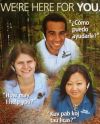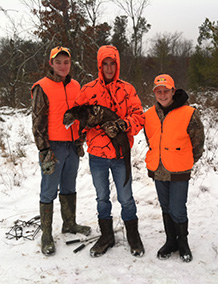Trapping in Wisconsin: continuing cultural heritage
Whether you crave the solitude of the winter landscape or you seek to pass on a family tradition, Wisconsin has many trapping opportunities for you.
Bobcat, fisher and otter quotas are now available
Details regarding bobcat, fisher and otter quotas and permit levels are now available [PDF]. Drawing results are also available by zone for each species.
Bobcat, fisher and otter zone information:
- Fisher: Oct 15 - Dec 31, 2016
- Bobcat Time Period 1: Oct 15 - Dec 25, 2016
- Bobcat Time Period 2: Dec 26 - Jan 31, 2017
- Otter: Southern Zone: Nov 5 - Mar 31, 2017
- Otter: Central and Northern Zones: Nov 5 - Apr 30, 2017
It is extremely unlikely that the Department would close a furbearer zone as harvester success rates from recent years are used to issue permits. This allows harvesters to approach or reach the quota without closing zones. Should the Department need to close a zone, notice would be given several days to a full week before closure, a press release would be issued and this page would be updated to reflect the closures.
Attention trappers: The Wisconsin Department of Natural Resources and the Association of Fish and Wildlife Agencies (AFWA) have partnered with Responsive Management to conduct a statewide study in Wisconsin about residents' opinions on wildlife and wildlife-related activities. State residents may receive a phone call from Responsive Management asking them to participate in a brief telephone survey about wildlife; selection of residents for participation is random to maintain a scientifically valid study. If you receive a call at home or on your cell phone, please consider participating in the study to assist the department and AFWA in better understanding residents' opinions on wildlife.
- Plan your season

- During your season

- Furbearer management

- Trapping publications

- Mammal Tracks on Wisconsin [PDF]
- Body-gripping traps: use & pet removal [PDF]
- Cable restraints in Wisconsin [PDF]
- Furbearer diseases [PDF]
- Regulated Trapping and Social Media [PDF]
- Traps, Trapping and Furbearer Management [PDF]
- Key Messages for Trappers [PDF]
- Trapping and Furbearer Management in North American Wildlife Conservation [exit DNR]
- Safe and Ethical Use of the Dryland Body-grip Trap in WI [PDF]

 More business resources
More business resources








